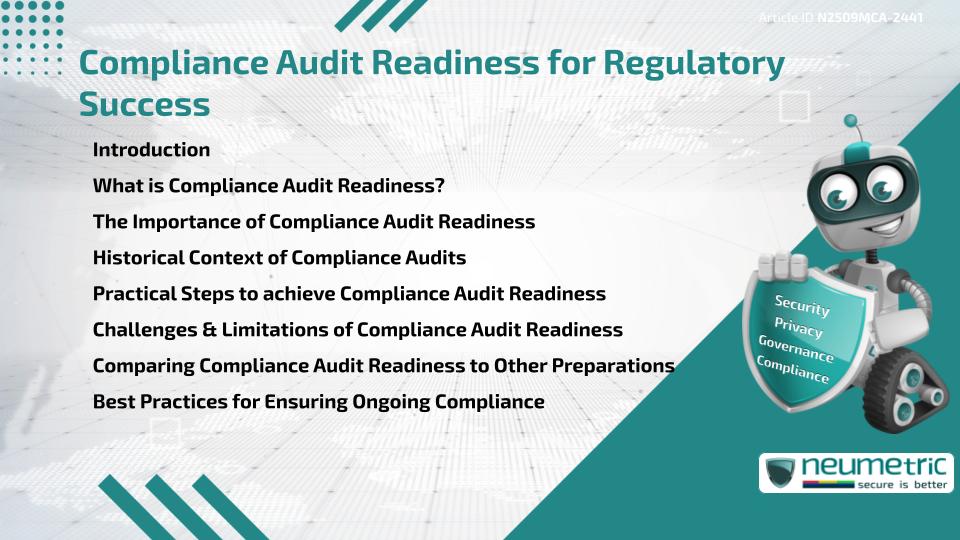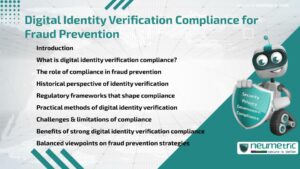Table of Contents
ToggleIntroduction
Compliance Audit readiness is the ability of an organisation to prepare, demonstrate & maintain Compliance with Legal & Regulatory requirements. It ensures that Policies, Controls & Processes are not only in place but are also consistently followed & documented. This readiness reduces the Risk of penalties, strengthens Trust with Stakeholders & supports Regulatory success. Understanding Compliance Audit readiness involves exploring its importance, historical background, practical steps, challenges, comparisons & Best Practices.
What is Compliance Audit Readiness?
Compliance Audit readiness refers to the proactive preparation of an organisation to undergo an Audit process that validates adherence to Regulatory Standards. It includes setting up Internal Controls, maintaining accurate Records & ensuring staff understand their roles in Compliance. Much like preparing for an academic exam, readiness requires consistent effort rather than last-minute action.
The Importance of Compliance Audit Readiness
Compliance Audit readiness is vital for Organisations because it:
- Minimises Financial & reputational Risks by ensuring adherence to laws.
- Increases efficiency by identifying Gaps early & fixing them before an official review.
- Builds credibility with Customers, Investors & Regulators.
- Reduces stress for Employees by creating clarity in processes.
Without readiness, Audits often uncover unpreparedness, leading to avoidable fines & strained Stakeholder relationships.
Historical Context of Compliance Audits
The practice of Compliance auditing traces back to early twentieth-century regulations, particularly in Financial services & Healthcare. Governments introduced standards to protect Consumers & maintain Market Integrity. Over time, Compliance Audits expanded to areas such as environmental management, workplace safety & Data Protection.
For example, regulations such as HIPAA in the United States created a demand for structured Compliance Audits. These historical developments underline why Compliance Audit readiness became essential for Organisations worldwide.
Practical Steps to achieve Compliance Audit Readiness
Achieving Compliance Audit readiness involves several steps:
- Documentation: Maintain clear, up-to-date Policies & Procedures.
- Internal Reviews: Conduct periodic self-Audits to identify issues early.
- Training: Educate Employees on their roles in maintaining Compliance.
- Record-Keeping: Ensure Accessibility & Accuracy of Records.
- Monitoring: Use technology to track Compliance in real-time.
Organisations can refer to Compliance management resources for deeper understanding of implementation strategies.
Challenges & Limitations of Compliance Audit Readiness
While beneficial, Compliance Audit readiness faces challenges:
- Resource Constraints: Smaller Organisations may lack funds for systems & training.
- Complexity of Regulations: Constantly changing rules make tracking difficult.
- Human Error: Mistakes in reporting or record-keeping can still occur.
- Time Pressure: Preparing for multiple Audits in a year can overwhelm staff.
These limitations show that while readiness is crucial, it is not foolproof.
Comparing Compliance Audit Readiness to Other Preparations
Compliance Audit readiness can be compared to preparing a house for inspection. Just as homeowners ensure safety checks & cleanliness before an inspection, Organisations align Policies & Processes before an Audit. Unlike one-time preparations, Compliance Audit readiness requires continuous upkeep similar to regular house maintenance.
Best Practices for Ensuring Ongoing Compliance
To maintain Compliance Audit readiness, Organisations should:
- Automate monitoring with Compliance software.
- Regularly update Training Programs.
- Keep open communication with Regulators.
- Develop a culture of Compliance where all Employees participate.
Best Practices help Organisations shift from reactive to proactive, ensuring long-term Regulatory success.
Conclusion
Compliance Audit readiness provides Organisations with the structure & discipline needed to meet Regulatory demands. It goes beyond preparing for an Audit day & instead fosters an ongoing culture of Compliance. By addressing historical context, applying practical steps & recognising challenges, Organisations can position themselves for sustainable success.
Takeaways
- Compliance Audit readiness reduces Risks & strengthens Trust.
- Historical regulations shaped its importance across industries.
- Preparation requires documentation, training & monitoring.
- Challenges include Resource constraints & Regulatory complexity.
- Ongoing Best Practices sustain Regulatory Compliance.
FAQ
What is Compliance Audit readiness?
It is the preparation & ability of an organisation to demonstrate Compliance with regulations through Audits.
Why is Compliance Audit readiness important?
It minimises Risks, improves Efficiency & builds Trust with Stakeholders.
How does Compliance Audit readiness differ from regular Audits?
Readiness is an ongoing process, while an Audit is a periodic review of Compliance status.
What industries need Compliance Audit readiness most?
Healthcare, Finance, Manufacturing & Technology sectors all rely heavily on Audit readiness.
What are common mistakes in Compliance Audit readiness?
Poor documentation, lack of training & failure to update Policies regularly are common mistakes.
Can Small Businesses achieve Compliance Audit readiness?
Yes, by focusing on clear Documentation, simple Monitoring Tools & Staff awareness.
How often should Organisations review Compliance Audit readiness?
Organisations should review readiness quarterly or after any major Regulatory change.
What tools can help with Compliance Audit readiness?
Software for monitoring, document management & training platforms can all support readiness.
Need help for Security, Privacy, Governance & VAPT?
Neumetric provides organisations the necessary help to achieve their Cybersecurity, Compliance, Governance, Privacy, Certifications & Pentesting needs.
Organisations & Businesses, specifically those which provide SaaS & AI Solutions in the Fintech, BFSI & other regulated sectors, usually need a Cybersecurity Partner for meeting & maintaining the ongoing Security & Privacy needs & requirements of their Enterprise Clients & Privacy conscious Customers.
SOC 2, ISO 27001, ISO 42001, NIST, HIPAA, HECVAT, EU GDPR are some of the Frameworks that are served by Fusion – a SaaS, multimodular, multitenant, centralised, automated, Cybersecurity & Compliance Management system.
Neumetric also provides Expert Services for technical security which covers VAPT for Web Applications, APIs, iOS & Android Mobile Apps, Security Testing for AWS & other Cloud Environments & Cloud Infrastructure & other similar scopes.
Reach out to us by Email or filling out the Contact Form…





